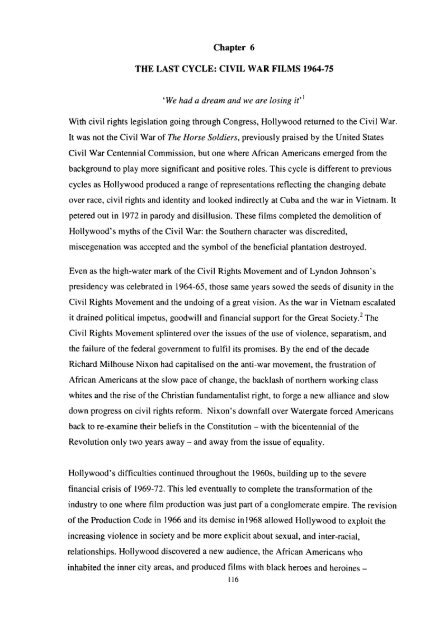Download (3483kB) - Greenwich Academic Literature Archive ...
Download (3483kB) - Greenwich Academic Literature Archive ...
Download (3483kB) - Greenwich Academic Literature Archive ...
- No tags were found...
You also want an ePaper? Increase the reach of your titles
YUMPU automatically turns print PDFs into web optimized ePapers that Google loves.
' We had a dream and we are losing it'With civil rights legislation going through Congress, Hollywood returned to the Civil War.It was not the Civil War of The Horse Soldiers, previously praised by the United StatesCivil War Centennial Commission, but one where African Americans emerged from thebackground to play more significant and positive roles. This cycle is different to previouscycles as Hollywood produced a range of representations reflecting the changing debateover race, civil rights and identity and looked indirectly at Cuba and the war in Vietnam. Itpetered out in 1972 in parody and disillusion. These films completed the demolition ofHollywood's myths of the Civil War: the Southern character was discredited,miscegenation was accepted and the symbol of the beneficial plantation destroyed.Even as the high-water mark of the Civil Rights Movement and of Lyndon Johnson'spresidency was celebrated in 1964-65, those same years sowed the seeds of disunity in theCivil Rights Movement and the undoing of a great vision. As the war in Vietnam escalatedit drained political impetus, goodwill and financial support for the Great Society. 2 TheCivil Rights Movement splintered over the issues of the use of violence, separatism, andthe failure of the federal government to fulfil its promises. By the end of the decadeRichard Milhouse Nixon had capitalised on the anti-war movement, the frustration ofAfrican Americans at the slow pace of change, the backlash of northern working classwhites and the rise of the Christian fundamentalist right, to forge a new alliance and slowdown progress on civil rights reform. Nixon's downfall over Watergate forced Americansback to re-examine their beliefs in the Constitution - with the bicentennial of theRevolution only two years away - and away from the issue of equality.Hollywood's difficulties continued throughout the 1960s, building up to the severefinancial crisis of 1969-72. This led eventually to complete the transformation of theindustry to one where film production was just part of a conglomerate empire. The revisionof the Production Code in 1966 and its demise in 1968 allowed Hollywood to exploit theincreasing violence in society and be more explicit about sexual, and inter-racial,relationships. Hollywood discovered a new audience, the African Americans whoinhabited the inner city areas, and produced films with black heroes and heroines -116
















